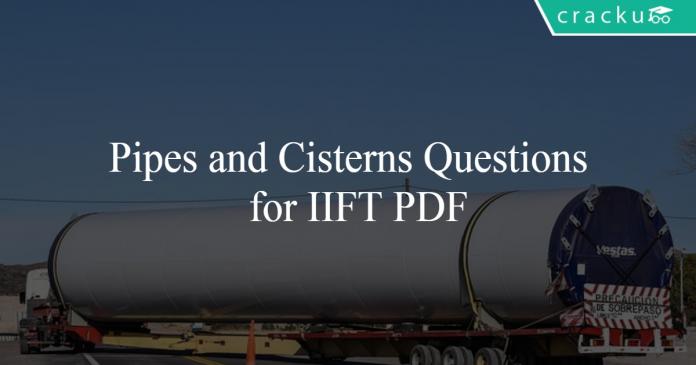Pipes and Cisterns Questions for IIFT PDF
Download important IIFT Pipes and Cisterns Questions PDF based on previously asked questions in IIFT and other MBA exams. Practice Pipes and Cisterns questions and answers for IIFT exam.
Download Pipes and Cisterns Questions for IIFT PDF
Get 50% Off on IIFT & Other MBA Test Series
Download IIFT Previous Papers PDF
Question 1: A water tank has M inlet pipes and N outlet pipes. An inlet pipe can fill the tank in 8 hours while an outlet pipe can empty the full tank in 12 hours. If all pipes are left open simultaneously, it takes 6 hours to fill the empty tank. What is the relationship between M and N?
a) M : N = 1 : 1
b) M : N = 2 : 1
c) M : N = 2 : 3
d) M : N = 3 : 2
e) None of the above
Question 2: Three pipes are connected to an inverted cone, with its base at the top. Two inlet pipes, A and B, are connected to the top of the cone and can fill the empty in 8 hours and 12 hours, respectively. The outlet pipe C, connected to the bottom, can empty a filled cone in 4 hours. When the cone is completely filled with water, all three pipes are opened. Two of the three pipes remain open for 20 hours continuously and the third pipe remains open for a lesser time. As a result, the height of the water inside the cone comes down to 50%. Which of the following options would be possible?
a) Pipe A was open for 19 hours.
b) Pipe A was open for 19 hours 30 minutes.
c) Pipe B was open for 19 hours 30 minutes.
d) Pipe C was open for 19 hours 50 minutes.
e) The situation is not possible.
Question 3: Three pipes A, B and C are connected to a tank. These pipes can fill the tank separately in 5 hours, 10 hours and 15 hours respectively. When all the three pipes were opened simultaneously, it was observed that pipes A and B were supplying water at 3/4th of their normal rates for the first hour after which they supplied water at the normal rate. Pipe C supplied water at 2/3rd of its normal rate for first 2 hours, after which it supplied at its normal rate. In how much time, tank would be filled.
a) 1.05 Hours
b) 2.05 Hours
c) 3.05 Hours
d) None of these
Question 4: A tank is connected with both inlet pipes and outlet pipes. Individually, an inlet pipe can fill the tank in 7 hours and an outlet pipe can empty it in 5 hours. If all the pipes are kept open, it takes exactly 7 hours for a completely filled-in tank to empty. If the total number of pipes connected to the tank is 11, how many of these are inlet pipes?
a) 2
b) 4
c) 5
d) 6
Practice IIFT Mock Tests
Question 5: Four two-way pipes A, B, C and D can either fill an empty tank or drain the full tank in 4, 10, 12 and 20 minutes respectively. All four pipes were opened simultaneously when the tank is empty. Under which of the following conditions the tank would be half filled after 30 minutes?
a) Pipe A filled and pipes B, C and D drained
b) Pipe A drained and pipes B, C and D filled
c) Pipes A and D drained and pipes B and C filled
d) Pipes A and D filled and pipes B and C drained
e) None of the above
Question 6: A tank is fitted with pipes, some filling it and the rest draining it. All filling pipes fill at the same rate, and all draining pipes drain at the same rate. The empty tank gets completely filled in 6 hours when 6 filling and 5 draining pipes are on, but this time becomes 60 hours when 5 filling and 6 draining pipes are on. In how many hours will the empty tank get completely filled when one draining and two filling pipes are on?
Question 7: A cylindrical overhead tank is filled by two pumps – P1 and P2. P1 can fill the tank in 8 hours while P2 can fill the tank in 12 hours. There is a pipe P3 which can empty the tank in 8 hours. Both the pumps are opened simultaneously. The supervisor of the tank, before going out on a work, sets a timer to open P3 when the tank is half filled so that tank is exactly filled up by the time he is back. Due to technical fault P3 opens when tank is one third filled. If the supervisor comes back as per the plan what percent of the tank is still empty?
a) 25% tank
b) 12% tank
c) 10% tank
d) None of the above
Question 8: A tank has an inlet pipe and an outlet pipe. If the outlet pipe is closed then the inlet pipe fills the empty tank in 8 hours. If the outlet pipe is open then the inlet pipe fills the empty tank in 10 hours. If only the outlet pipe is open then in how many hours the full tank becomes half-full?
a) 20
b) 30
c) 40
d) 45
Answers & Solutions:
1) Answer (E)
M inlet pipe can fill $(\frac{M}{8})^{th}$ part of the tank in 1 hour.
Similarly, N outlet pipes can empty $(\frac{N}{12})^{th}$ part of the tank in 1 hour.
=> $\frac{M}{8} – \frac{N}{12} = \frac{1}{6}$
=> $6 M – 4 N = 8$
=> $M = \frac{4 + 2 N}{3}$
If, N = 1, => M = 2 => $M : N = 2 : 1$
If, N = 4, => M = 4 => $M : N = 1 : 1$
Thus, Ans – (E)
2) Answer (C)
Height of cone comes down to 50%, => it becomes $\frac{1}{2}$
=> Volume would become $\frac{1}{8}$ as radius will also become half by similar triangles.
Let the capacity of cone = 24 litres
Volume of water left in the cone = $24 – \frac{1}{8} \times 24 = 21$ litres
Pipe A’s efficiency = $\frac{24}{8} = 3$ litres/hr
Pipe B’s efficiency = $\frac{24}{12} = 2$ litres/hr
Pipe C’s efficiency = $\frac{24}{-4} = -6$ litres/hr
All will run 19 hours simultaneously (going by the options)
=> Net effect = $(3 + 2 – 6) \times 19 = -19$ litres
This means that after 19 hours, 19 litres of water has been removed, we need to remove 2 more litres as per the requirement. Thus, C will definitely run for another hour.
If we run A and C together for the 20th hour, net effect = $(3 – 6) \times 1 = -3$ litres
Run B for 30 minutes => $2 \times \frac{1}{2} = 1$ litres
$\therefore$ Volume of water removed = $-19 -3 + 1 = -21$ litres
Thus, Pipe B was open for 19 hours 30 minutes.
3) Answer (C)
Let the capacity of the tank be 60 litres.
Capacity of the first pipe = 12 l/hr
Capacity of the second pipe = 6 l/hr
Capacity of the third pipe = 4 l/hr
In 2 hrs, first pipe fills (9 + 12) l = 21 l
In 2 hrs, second pipe fills (4.5 + 6) = 10.5 l
In 2 hrs, third pipe fills (16/3) l
In 2 hrs, tank filled = (21 + 10.5 + 5.33) l = 36.83 l
Tank left to be filled = (60 – 36.83) l = 23.17 l
Time required = (23.17/22) hr = 1.05 hrs
Total time = 3.05 hrs
Hence, option C is the correct answer.
4) Answer (D)
Let the number of inlet pipes be x, then the number of outlet pipes will be 11-x.
The rate of emptying the tank is more than filling the tank if all the pipes are kept opened.
$\frac{11-x}{5}$ – $\frac{x}{7}$ = $\frac{1}{7}$
Solving, 12x =72,Hence x = 6
Therefore, the number of inlet pipes is 6.
Top 500+ Free Questions for IIFT
IIFT Previous year question answer PDF
5) Answer (A)
Let us assume the volume of the tank to be 60 litres.
A can fill or empty 60/4 = 15 litres in a minute.
B can fill or empty 60/10 = 6 litres in a minute.
C can fill or empty 60/12 = 5 litres in a minute.
D can fill or empty 60/20 = 3 litres in a minute.
We have to find the combination for which the tank will be half-full in 30 minutes (i.e., completely filled in 1 hour).
Therefore, the combination must result in a net input of 60/60 = 1 litre per minute.
Let us evaluate the options.
Option B:
Pipe A drained and pipes B, C and D filled
The net result will be -15 + 6 + 5 + 3 = -1 litre/minute. We can eliminate option B.
Option C:
Pipes A and D drained and pipes B and C filled
The net result will be -15-3+6+5 = -7 litres/minute. We can eliminate option C as well.
Option D:
Pipes A and D filled and pipes B and C drained
The net result will be 15+3-6-5 = 7 litres/minute. We can eliminate option D as well.
Option A:
Pipe A filled and pipes B, C and D drained
The net result will be 15-6-5-3 = 1 litre/minute.
Therefore, option A is the right answer.
6) Answer: 10
Let the efficiency of filling pipes be ‘x’ and the efficiency of draining pipes be ‘-y’.
In the first case,
Capacity of tank = (6x – 5y) * 6……….(i)
In the second case,
Capacity of tank = (5x – 6y) * 60…..(ii)
On equating (i) and (ii), we get
(6x – 5y) * 6 = (5x – 6y) * 60
or, 6x – 5y = 50x – 60y
or, 44x = 55y
or, 4x = 5y
or, x = 1.25y
Capacity of the tank = (6x – 5y) * 6 = (7.5y – 5y) * 6 = 15y
Net efficiency of 2 filling and 1 draining pipes = (2x – y) = (2.5y – y) = 1.5y
Time required = $\dfrac{\text{15y}}{\text{1.5y}}$hours = 10 hours.
Hence, 10 is the correct answer.
7) Answer (C)
P1 can fill the tank in 8 hours while P2 can fill the tank in 12 hours therefore when Both the pumps are opened simultaneously they can fill $\frac{1}{8}$ + $\frac{1}{12}$ = $\frac{5}{24}$ this much of tank in an hour.Therefore Time required by P1 and P2 to fill full tank is $\frac{24}{}$ Hence they can fill half the tank in $\frac{12}{5}$ = 2.4 hours. After all the 3 pipes are opened the tank will be filled at the rate of $\frac{1}{8}$ + $\frac{1}{12}$ – $\frac{1}{8}$ = $\frac{1}{12}$ therefore for filling the remaining tank we will need 6 more hours. If supervisor was planning to come exactly when the tank is fully filled then he must come after 8.4 hours
Time required by P1 and P2 to fill 1/3rd of the tank is $\frac{24}{5*3}$ = $\frac{8}{5}$ = 1.6 hours therefore supervisor will come after = 8.4 – 1.6 = 6.8 hours
In 6.8 hours all the three pipe will fill $\frac{6.8}{12}$ = 0.56 of the capacity of tank
therefore remaining tank to be filled when the supervisor comes = 1- 0.56 – 0.33 $\approx$ 0.1 i.e. 10%
Therefore option ‘C’ is our answer
8) Answer (A)
Let the time taken by the outlet pipe to empty = x hours
Then, $\frac{1}{8} – \frac{1}{x} = \frac{1}{10}$
=> $x = 40$
Hence time taken by the outlet pipe to make the tank half-full = 40/2 = 20 hour
IIFT Previous year question answer PDF
We hope this Pipes and Cisterns questions and answers PDF will be helpful to you.





![CAT Averages Questions PDF [Important Questions] CAT AVERAGES Questions PDF](https://cracku.in/blog/wp-content/uploads/2022/07/CAT-AVERAGES-Questions-PDF-218x150.png)